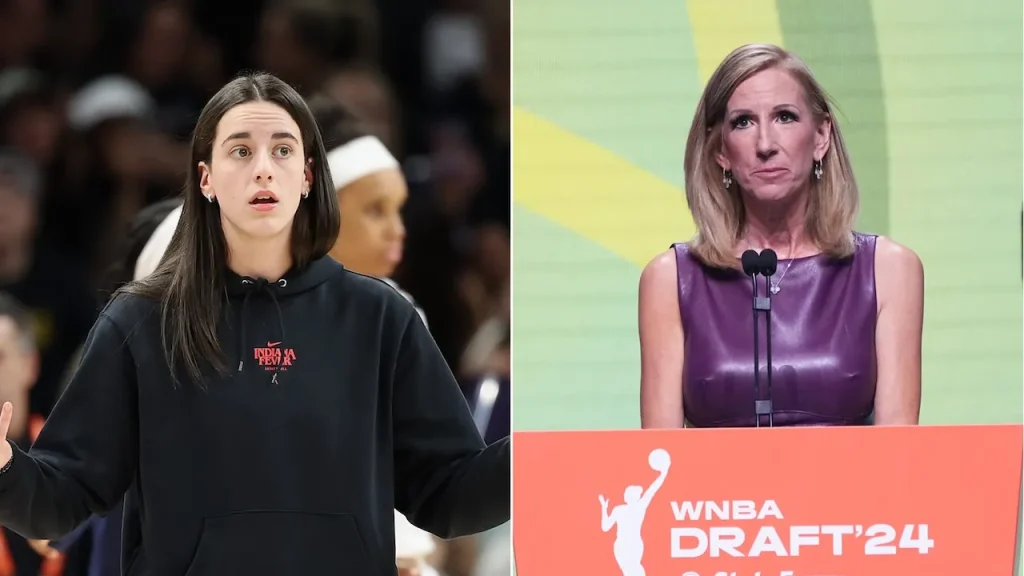WNBA Commissioner’s Comments on Player Compensation Stir Controversy
In a recent development that has rippled through women’s professional basketball, WNBA Commissioner Cathy Engelbert found herself at the center of controversy following allegations about comments she supposedly made regarding star rookie Caitlin Clark’s earnings. The situation unfolded after Minnesota Lynx player Napheesa Collier claimed Engelbert had said Clark “should be grateful she makes $16 million off the court because without the platform that the WNBA gives her, she wouldn’t make anything.” This allegation, which Engelbert has firmly denied, sparked intense debate across social media platforms and within basketball circles about player compensation and the league’s relationship with its athletes.
The controversy gained additional context when Engelbert’s previous public statements about Clark’s earning potential resurfaced. During an April 2024 interview at the CNBC Changemakers Summit, shortly after Clark was selected as the No. 1 pick in the WNBA Draft by the Indiana Fever, Engelbert had discussed the rookie’s financial prospects: “Caitlin has the ability to make up to a half-million dollars just in WNBA wages this year… She also has millions and millions of dollars in endorsements. Because she declared to become pro, her endorsements are higher in dollar value, she has a global platform now, not just a US platform, so she’s going to do just fine as will the top players in the league.” These comments, while not identical to what Collier alleged, touched on similar themes regarding the disparity between league salaries and outside endorsement opportunities for star players.
The timing of this controversy is particularly significant as it occurs during negotiations for a new collective bargaining agreement between the WNBA and the Women’s National Basketball Players Association (WNBPA). The current agreement, established in 2020, is set to expire on October 31 after the WNBPA voted to opt out early. This backdrop of labor negotiations intensifies scrutiny on Engelbert’s comments and the league’s stance toward player compensation. Clark, who has become one of the most marketable athletes in women’s sports, has a base WNBA salary of just $76,535 in her rookie season—a stark contrast to her eight-year, $28 million Nike deal signed before she ever played a professional game. This disparity highlights the broader conversation about WNBA player salaries at a time when the league is experiencing unprecedented growth and visibility.
Beyond the specific allegations regarding Clark, Collier also claimed Engelbert told players they “should be on their knees, thanking their lucky stars for the media rights deal” she secured for them—a comment Engelbert notably did not directly deny when addressing the controversy. Instead, the commissioner spoke more generally about “inaccuracies” in reporting and expressed personal distress over the situation, saying, “I’m disheartened. I’m a human too. I have a family. I have two kids who are devastated by these comments.” While firmly denying the comments about Clark, whom she described as “a transformational player” who has “brought in tens of millions of new fans to the game,” Engelbert’s partial response to the allegations has left some questions unanswered and contributed to ongoing tensions.
The public reaction to this controversy has been swift and widespread, with fans, media personalities, and even active players expressing concern about the reported attitude toward player value and compensation. The situation reflects deeper tensions within women’s professional basketball about recognition, respect, and financial reward during a period of substantial growth for the sport. Players like Clark and others have dramatically increased the WNBA’s visibility and marketability, leading many to question whether the league’s compensation structure adequately reflects their contribution to this success. The contrast between modest league salaries and substantial endorsement deals for top stars highlights structural questions about how player value is determined and rewarded.
In addressing the controversy before Game 1 of the WNBA Finals, Commissioner Engelbert acknowledged that improvements are needed in how the league communicates its appreciation of players: “I was disheartened to hear that some players feel the league and that I personally do not care about them or listen to them. If the players in the ‘W’ don’t feel appreciated and value from the league, we have to do better, and I have to do better.” This acknowledgment suggests an opening for meaningful dialogue as collective bargaining continues, but also underscores the significant work ahead in rebuilding trust between league leadership and players. As the WNBA continues its remarkable growth trajectory—fueled in part by transcendent talents like Clark—finding a sustainable approach to player compensation that acknowledges both their on-court value and their role in growing the business will remain a central challenge for Engelbert and league executives.


